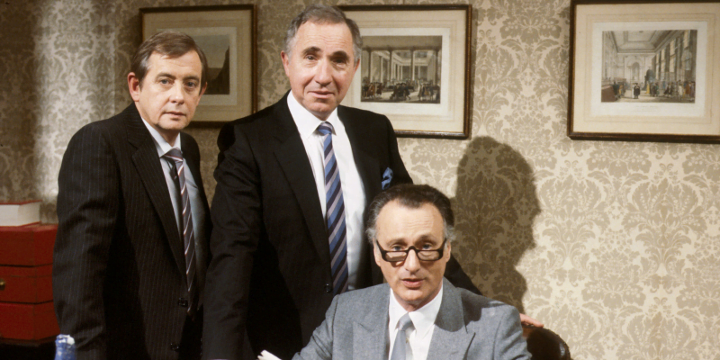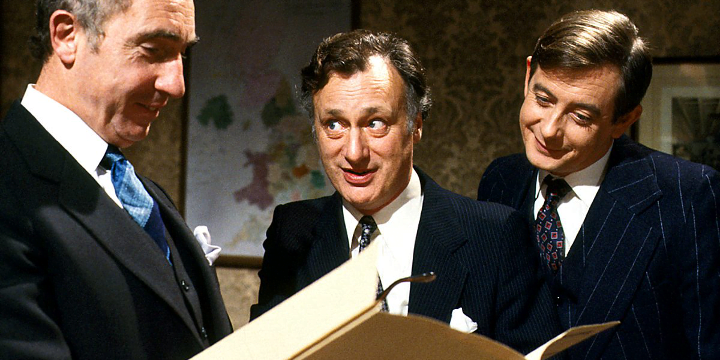Story Pile: Yes Minister
I feel old.
I’ve taken in my efforts to stave off this feeling, but it’s undeniable. I feel old, even though I know full well that ‘millenial’ talk is targeted at me. Part of why is because the things of my youth are not the things of other people’s youth. I was raised on The Goon Show and I’m Sorry I’ll Read That Again and obscure Christian media. My media background was ultimately not for me – it was for my father.
Lots of it went over my head. The Goon Show had overtones of sex farce and tons of racy humour that I completely missed. I’m Sorry I’ll Read That Again built on a host of tropey fantasy and panto skit comedy that I totally missed, and I only now realise what a slide whistle means.
One series of my father’s loves, which was contemporary to my birth, and therefore, completely beyond me until, well, now, is Yes Minister.

It’s fascinating actually in that it has a lot in common with Seinfeld. While the point of Seinfeld was that it was a show about nothing1., with stories that showed people spending huge amounts of effort on tiny nothings, the thrust of Yes Minister was inverted. Episodes of Yes Minister are spent ranging across spaces of days at a time, with enormous outcomes on the line, in which almost nothing ever gets to happen. But while Seinfeld’s narrative structure is bent to the frantic expenditure of energy achieving nothing, the narrative of Yes Minister is the frantic expenditure of energy achieving nothing.
It’s that kind of word play is throughout the series.
It’s also a show where instantaneous communication as we have it now would totally desolate some plots.
One of the challenges of making a sit-com is that it’s meant to be a situation comedy, a comedy that exists, as it were, in situ, in its own place. The dialogue therefore is trying to serve both comedy, with timing and wordplay, and also be some form of naturalistic. You can look at the comedy of say, Everybody Loves Raymond or Big Bang Theory with gigantic, stratified pauses between people talking to allow for reactions, which well, we’ll pretend that’s actually about the jokes being funny rather than signalling that they are meant to be. Anyway, the point is that it’s very difficult to make dialogue serve both funny and natural.
Yes Minister achieves this by having the comedy in dialogue mostly derive from the three voices in almost every given room be either deliberately obfuscating and smug, well-intentioned and prone to blurting, and wavering between the three the voice of Jim Hacker trying desperately to be funny and score a point of the others as a way to signify his own intelligence. This is a series of people being witty at one another, and in the context of the space they’re in, this is naturalistic dialogue. They want to show they’re smarter and funnier than one another.

The really interesting thing to me, now, about Yes Minister, watching it in hindsight isn’t so much that it’s funny – it is, it’s very funny, if you like a particular kind of playfully cynical word play and manipulation – or even that, it’s about how much of the narrative is things that we are dealing with now.
British Government is a fascinating warren of discretions and traditions and importantly deliberate vaguearies, and Yes Minister is set in a time when the EU is about to come into being and the Cold War was still quite cold. Countries in Africa were escaping colonial power. There’s a recognition that America is both powerful and blisteringly foolish as a global power, and there’s a reasonable expectation that the government is spending much of its time trying to move things around and that a lot of what’s going on is actually in service of nothing.
There is a fascinating intricacy to it all where largely, the sheer scope of British bureaucracy is presented as both a problem and a result. The size of government and the people involved in it, the story tells you, are related. You can’t ask for more work without asking for more people to do them. There’s talk about the UK’s role in the then-nascent EU, which was explicitly framed in terms of the very cultural reasons the UK saw the EU as an opportunity to join – or rather the EEC, at the time.
It’s all so interesting to me because it carries within it some very real but very cynical truths about the way things happened. Things that I like, things I believe in, could almost always be viewed in terms of short-term pettiness and spite. And it serves as a counterpoint to The West Wing, which was as much fanfiction of how America could have been in the late 90s as it shows an England of the early 80s.
What brought me to check this out again?
It was this quote:
Sir Humphrey: The only way to understand the Press is to remember that they pander to their readers’ prejudices.
Jim Hacker: Don’t tell me about the Press. I know *exactly* who reads the papers. The Daily Mirror is read by the people who think they run the country. The Guardian is read by people who think they *ought* to run the country. The Times is read by the people who actually *do* run the country. The Daily Mail is read by the wives of the people who run the country. The Financial Times is read by people who *own* the country. The Morning Star is read by people who think the country ought to be run by *another* country. The Daily Telegraph is read by the people who think it is.
Sir Humphrey: Prime Minister, what about the people who read The Sun?
Bernard Woolley: Sun readers don’t care *who* runs the country – as long as she’s got big tits.
1. I personally don’t buy this. Seinfeld seems to really be a show about how it’s totally okay to be a self-obssessed prick.